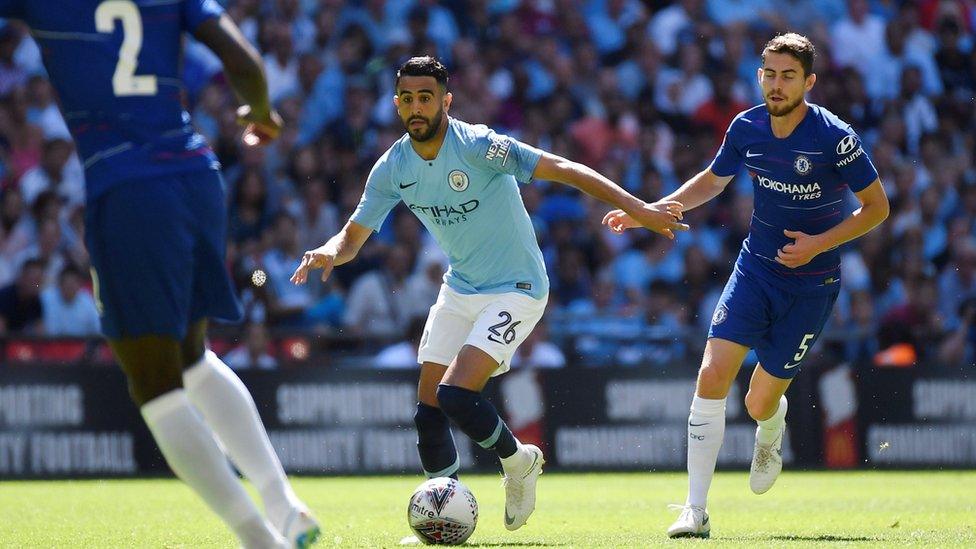Reality Check: What could Brexit mean for the Premier League?
- Published
![Miles Jacobson saying: Around 25% of players in the Premier League - that's 152 [players] - would definitely not get work permits.](https://ichef.bbci.co.uk/ace/standard/976/cpsprodpb/11C1C/production/_102923727_jacobson_quote.png)
The claim: A quarter of players in the Premier League would definitely not get work permits if players from the EU were treated the same as non-EU players.
Reality Check verdict: While several Premier League players would not automatically qualify for work permits we cannot say that they definitely would not qualify via the Football Association's Exceptions Panel.

Miles Jacobson, director of Sports Interactive, the company behind the Football Manager video games, was on BBC Radio 4 on Friday talking about the potential impact of Brexit on the Premier League.
At the moment, players from the European Union are allowed to play professional football in England as part of freedom-of-movement rules, while those from outside the EU need work permits.
Mr Jacobson said that if the rules for players from the EU were the same as the current ones for non-EU players, 152 players - about 25% of the total - would "definitely not get work permits".
The rules for non-EU players are not simple.
To get a work permit, a player has to get a Governing Body Endorsement (GBE), external from the Football Association.
They are automatically eligible if they meet the criteria based on the proportion of their national team's competitive games they have taken part in in the last two years. How much they need to have played depends on how highly-ranked their national team is.
1 to 10 on Fifa rankings - at least 30%
11 to 20 on Fifa rankings - at least 45%
21 to 30 on Fifa rankings - at least 60%
31 to 50 on Fifa rankings - at least 75%
It's reasonably easy to work out which players would qualify for an automatic GBE.

But if a player does not automatically qualify, their prospective club can apply to the Exceptions Panel, external, arguing that the player's experience and value mean that they should be granted a GBE, despite their lack of (qualifying) international football.
The panel operates on a points-based system, awarding points if the club is paying a relatively high transfer fee for the player or relatively high wages, or if they have previously played for a club in a top league that has participated in a continental competition such as the Champions' League.
The Exceptions Panel may award a GBE if the player has enough points, but does not necessarily have to, which means it is impossible to say that a particular player would definitely not get a work permit.
Big transfers
Among the examples that Mr Jacobson gave of players in the Premier League who would not get a work permit was Arsenal's French striker Alexandre Lacazette.
Lacazette played in three competitive matches for France in the last two years, which is not enough to get to the 30% he would need for an automatic GBE.
But the £46.5m that Arsenal paid Lyon for him in 2017 together with reported wages of more than £10m a year should give him enough points to allow the Exceptions Panel to grant him a GBE if it wanted to.
Mr Jacobson has since apologised on Twitter, external for mentioning Lacazette.
He also cited Manchester City's £60m winger Riyad Mahrez (who was born in France although he plays for Algeria) and Chelsea's £57m Italian midfielder Jorginho (both pictured above playing in the Community Shield) who would also hope their transfer fees and wages would have been enough to convince the Exceptions Panel.
But while Riyad Mahrez might have a chance of getting a work permit today, he would have been very unlikely to have qualified for one in 2014 when he transferred from French second division side Le Havre, to Leicester City.
We do not know if EU players will end up being treated in the same way as non-EU players. Other deals might be done and if there is a withdrawal agreement, between the UK and the EU, then existing players would be able to stay.
If they do end up being treated the same, there will certainly be players who do not qualify for work permits, but we cannot say how many of them will be cleared by the Exceptions Panel.
And any changes would be likely to have more of an impact on the lower divisions of English football where players are less likely to be internationals or be approved by the Exceptions Panel.


